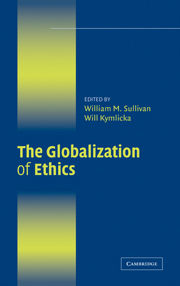Book contents
- Frontmatter
- Contents
- Contributors
- Acknowledgments
- 1 Introduction: The Globalization of Ethics
- 2 Global Ethics and the International Law Tradition
- 3 Morality and Universality in Jewish Thought
- 4 Globalization and Christian Ethics
- 5 Buddhism and the Globalization of Ethics
- 6 Muslim Perspectives on Global Ethics
- 7 Confucianism: Ethical Uniformity and Diversity
- 8 Natural Law, Common Morality, and Particularity
- 9 Liberalism and the Globalization of Ethics
- 10 Feminist Perspectives on a Planetary Ethic
- 11 Ethical Universalism and Particularism: A Comparison of Outlooks
- Appendix: Key Documents on Global Ethics
- A Universal Declaration of Human Rights
- B International Covenant on Civil and Political Rights
- C International Covenant on Social, Economic and Cultural Rights
- D Declaration Toward a Global Ethic
- E Universal Islamic Declaration of Human Rights
- F Cairo Declaration on Human Rights in Islam
- G The Bangkok Declaration
- H Asian Human Rights Charter: A People's Charter
- Bibliography
- Index
E - Universal Islamic Declaration of Human Rights
Published online by Cambridge University Press: 03 September 2009
- Frontmatter
- Contents
- Contributors
- Acknowledgments
- 1 Introduction: The Globalization of Ethics
- 2 Global Ethics and the International Law Tradition
- 3 Morality and Universality in Jewish Thought
- 4 Globalization and Christian Ethics
- 5 Buddhism and the Globalization of Ethics
- 6 Muslim Perspectives on Global Ethics
- 7 Confucianism: Ethical Uniformity and Diversity
- 8 Natural Law, Common Morality, and Particularity
- 9 Liberalism and the Globalization of Ethics
- 10 Feminist Perspectives on a Planetary Ethic
- 11 Ethical Universalism and Particularism: A Comparison of Outlooks
- Appendix: Key Documents on Global Ethics
- A Universal Declaration of Human Rights
- B International Covenant on Civil and Political Rights
- C International Covenant on Social, Economic and Cultural Rights
- D Declaration Toward a Global Ethic
- E Universal Islamic Declaration of Human Rights
- F Cairo Declaration on Human Rights in Islam
- G The Bangkok Declaration
- H Asian Human Rights Charter: A People's Charter
- Bibliography
- Index
Summary
Adopted by the Islamic Council, London, April 15, 1980.
21 Dhul Qaidah 1401, 19 September 1981.
This is a declaration for mankind, a guidance and instruction to those who fear God.
(Al Qur'an, Al-Imran 3:138)
Foreword
Islam gave to mankind an ideal code of human rights fourteen centuries ago. These rights aim at conferring honour and dignity on mankind and eliminating exploitation, oppression and injustice.
Human rights in Islam are firmly rooted in the belief that God, and God alone, is the Law Giver and the Source of all human rights. Due to their Divine origin, no ruler, government, assembly or authority can curtail or violate in any way the human rights conferred by God, nor can they be surrendered.
Human rights in Islam are an integral part of the overall Islamic order and it is obligatory on all Muslim governments and organs of society to implement them in letter and in spirit within the framework of that order.
It is unfortunate that human rights are being trampled upon with impunity in many countries of the world, including some Muslim countries. Such violations are a matter of serious concern and are arousing the conscience of more and more people throughout the world.
I sincerely hope that this Declaration of Human Rights will give a powerful impetus to the Muslim peoples to stand firm and defend resolutely and courageously the rights conferred on them by God.
- Type
- Chapter
- Information
- The Globalization of EthicsReligious and Secular Perspectives, pp. 247 - 256Publisher: Cambridge University PressPrint publication year: 2007



